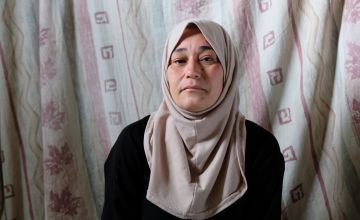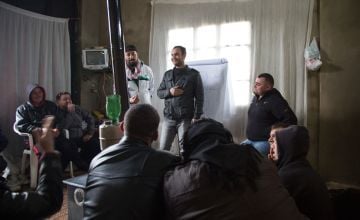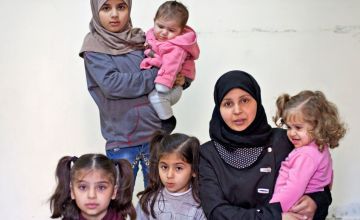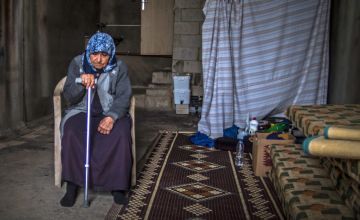
Read our 2024 annual report

Knowledge Hub
For the last 12 years, a protracted crisis has resulted in millions of Syrians taking refuge abroad. Many of them are women, who arrive in refugee camps or communities with no money, no prospects, and no preparation for the unique challenges they will face.
"Every day is like a year here," Yara* told us from her informal refugee settlement in Lebanon. "We were living. Now we have nothing."
Yara is one of the millions of Syrian refugees who have found temporary shelter in neighbouring host communities, and like many she faced grave challenges simply getting out of her home country. For the last 12 years, Syria has been caught in a protracted conflict that escalated into a full humanitarian crisis. This has had a disproportionate impact on Syrian refugee women, many of whom arrive in a refugee camp or community with no money, no prospects, and the new responsibility of being the head of a household, whether it’s their own children or also extended family. All of this comes with a set of unique challenges.
Where Syrian refugee women are coming from
Before we dive in, some context might be helpful: Prior to the start of the war, and throughout most of the 20th Century, gender equality in Syria had been the subject of debate and discourse. Many of Syria’s norms, traditions, and even laws may seem regressive in comparison to other countries. Women only gained the right to vote in national elections in the mid-1950s. Women are allowed to work but still only made up a small percent of the pre-war workforce. Marriage in Syria is still considered to be a contract between the husband and his wife’s father.

1. Domestic and gender-based violence
As refugees, many Syrian men are unable to find work and provide for their families. This has upset their traditional role within the family over the last twelve years, leading to stress and lowered self-esteem. As men face mounting desperation, their frustration has increasingly turned into physical violence towards their wives. Women have reported that stress has led to them to be violent towards their children as well. Due to the way marriage and domestic abuse have been traditionally and legally regarded in Syria, most women are reluctant to leave their husbands and partners. Many are unaware that social services are even available to them in this case.
Even if a woman is unmarried or in a safe domestic environment, however, she may still be subject to gender-based violence (including sexual assault, forced marriage, and honor killings). In Lebanon, whose population is nearly 30% Syrian refugees, there are no formal camps for those living in displacement. This means that many Syrians in the country find informal tented settlements, abandoned buildings being rented out to refugees, or other accommodations that offer little security or protection. “I cannot sleep at night as there is no defence, no windows. I don’t feel safe,” Nofah*, a 36-year-old mother who lives with her husband and children told us from one such settlement in 2018. “Often, people come at night to peer through the space where windows should be, especially at the women.”

2. Early and forced marriage
Even before the war, approximately 10% of Syrian marriages involved a bride under the age of 18 (the legal age for marriage in the country is 17 for girls and 18 for boys). A recent UNICEF report suggests that the rate for early marriage in some camps went as high as 32%.
Much of this is out of necessity, thanks to the cultural and economic protections that marriage offers Syrian women and girls. For parents struggling with the financial challenges of living as refugees (often unable to work in a job similar to what they had at home before the war), marrying off their daughter means one less mouth to feed, while ensuring that their daughter will be taken care of by someone whose means are better than their own. Early and forced marriages have also been increasingly used in the last decade to help daughters escape violence and conflict at home in Syria, and stay protected from sexual harassment and assault in displacement camps.
However, even in the best of circumstances, many parents regret this choice even while viewing it as a grim necessity. In 2012, Shiya* married off her 13-year-old daughter as a safety measure. "She married too young," Shiya said. "But because of the war, we decided together as a family that it was better for her to get married and be protected."
3. Suddenly being the head of their household — and needing to provide
Before the war broke out, many Syrian women were educated, but few were a part of the workforce. The Syrian crisis, however, has led to many Syrian refugee women becoming the head of their household, whether it’s because their husbands were killed, had disappeared, or were unable to join them when they escaped the country. For many women, this means that they need to learn a practical skill that they can use to earn income as refugees, which is a small list to begin with. Some have turned to sex work in order to get the basics needed to survive.
Even those who were employed before the war find this new scenario a struggle. Nour*, who worked as a teacher and a tailor, was abandoned by her husband who left for Turkey and refused to send any financial support. "I live in an unfamiliar place without enough money and without a job," she told Concern, adding that she not only cared for her four children, but also her 16-year-old nephew. "I feel alone."

4. Anxiety, depression and PTSD
Mental health issues are common among refugees regardless of gender, but each faces unique challenges. Crisis and conflict come at a high cost to the status quo, and for many Syrian refugee women, their worlds as they’ve known them have become completely upended. Those who are living in displacement without some connection to their previous "normal" lives (such as family members — especially male ones) are increasingly vulnerable towards feelings of isolation, loneliness and desperation.
This is exactly what happened for Nour when she was left on her own as the provider of her family of six. "I am waiting for death," she told Concern after noting that she had attempted suicide several times (her neighbours have often come to her rescue). "I have no hope in this life."

5. Ongoing emergencies and challenges
In many cases, progress was made over the last several years of the conflict when it came to Syrian refugee women. Social support services were made more readily available — to women and men — and more accessible. Caregiver engagement programs helped those caring for children navigate stress and family dynamics. Syrian women could also access skills training and many had begun to learn ways of protecting themselves and feeling safer in their host communities.
However, other emergencies in the region have undone much of the progress. In Lebanon and Jordan, the United Nations High Commissioner for Refugees (UNHCR) reported a drop in calls to the protection hotlines for gender-based violence during the first lockdown in 2020, not because the amount of abuse had dropped, but because the ability to safely and discreetly make a call had with shelter-in-place orders. Lockdown also delayed processing of paperwork, shut down child care centres, and caused countless other interruptions to daily life, the burdens of many being shouldered by women and girls.
In 2023, a new crisis for Syrian women — particularly those living as refugees in neighbouring Türkiye — has emerged with the devastating series of earthquakes that hit both countries. Women and girls are particularly vulnerable to sexual assault and other forms of gender-based violence in the wake of a natural disaster, and even if this is not the case for everyone, the psychological toll of the earthquakes combined with lost homes, assets, loved ones, and lives, will continue to have an outsized effect on the most vulnerable.
Concern’s work with Syrian refugees
Concern Worldwide has been responding to the crisis in Syria since 2013. Our teams on the ground provide food and non-food items, including plastic sheeting, floor mats, solar lights, and blankets. Maintaining a very rapid emergency response, our turnaround time is generally 2 days for assessment and distribution.
In 2023, Concern is also responding to the needs left in the wake of the earthquakes that hit Türkiye and Syria, including providing psychosocial support, hot meals, and non-food essentials.

